Marrakech’s Jewish heritage represents a vibrant chapter in the city’s history, marked by centuries of coexistence and cultural exchange. Since the 15th century, the Jewish community has contributed significantly to Marrakech’s economic and social fabric, with landmarks like the Mellah and Aben Danan Synagogue standing as testaments to their enduring legacy. As preservation efforts gain momentum and tourism flourishes, the question arises: how will this rich heritage shape the future of Marrakech’s identity? Exploring the layers of this unique cultural tapestry reveals not only its past but also its potential influence on the city’s evolving narrative.
Key Points
- The Jewish community in Marrakech dates back to the 15th century, significantly influencing trade, finance, and the arts.
- Historic sites like the Mellah and Lazama Synagogue highlight the architectural and cultural heritage of Moroccan Jews.
- The Museum of Moroccan Judaism showcases artifacts that celebrate the unique cultural contributions of Jews in Marrakech.
- Jewish traditions, such as festivals and culinary practices, blend with local culture, enriching the city’s diversity.
- Ongoing preservation efforts and increased tourism are vital for maintaining the Jewish heritage and fostering interfaith dialogue in Marrakech.
Historical Significance
While exploring the Jewish Heritage in Marrakech, participants uncover a rich tapestry of history that reflects the city’s diverse cultural influences.
The Jewish community, dating back to the 15th century, played a vital role in Marrakech’s development. They contributed significantly to trade, finance, and the arts, establishing a vibrant presence amidst the bustling markets and intricate architecture.
Visitors learn about the historic Mellah, the Jewish quarter, characterized by its unique architecture and cultural landmarks. Significant sites, like the Lazama Synagogue, showcase the community’s resilience and adaptability over centuries.
This layered history reveals how Moroccan Jews have shaped and enriched Marrakech’s identity, leaving a lasting legacy that’s integral to the city’s narrative.
This exploration invites deeper appreciation for cultural interconnections that define the region.
You can also read our reviews of more historical tours in Marrakech
Jewish Community in Marrakech
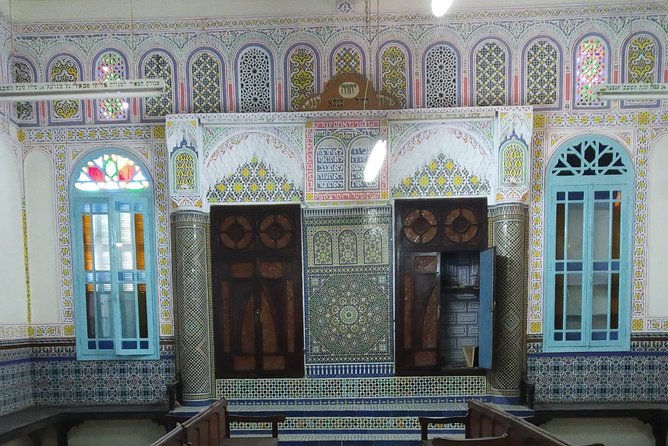
The Jewish community in Marrakech has a storied past that reflects its resilience and adaptability over centuries.
Once thriving, this community played a vital role in the city’s cultural and economic life, contributing to trade and craftsmanship.
Despite facing various challenges, including periods of discrimination, the Jewish inhabitants maintained their traditions and identity.
Today, the community remains small but vibrant, with efforts focused on preserving their heritage.
Synagogues, schools, and cultural initiatives reflect their ongoing commitment to their roots.
The interactions between the Jewish community and their Muslim neighbors illustrate a rich tapestry of coexistence.
As Marrakech evolves, the Jewish community’s history continues to be an essential part of the city’s narrative, highlighting their enduring spirit and contributions.
Notable Sites to Visit
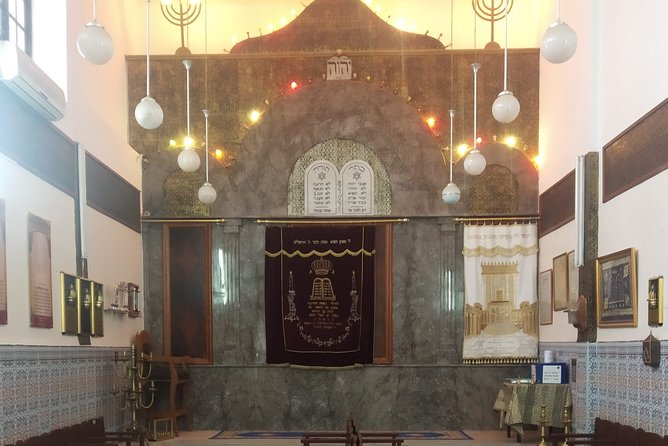
Marrakech is home to several notable sites that showcase its rich Jewish heritage, inviting visitors to explore the remnants of a once-thriving community.
One of the highlights is the historic Mellah, the Jewish quarter filled with narrow streets and charming architecture. The Aben Danan Synagogue, beautifully restored, offers a glimpse into the spiritual life of the community.
Visitors should also check out the Jewish Cemetery, where ornate tombstones reflect centuries of history. Plus, the Museum of Moroccan Judaism presents artifacts and exhibitions that celebrate Jewish culture in Morocco.
Each site tells a unique story, allowing travelers to connect with the vibrant history that shaped Marrakech’s identity. These sites are essential for anyone interested in understanding the city’s diverse past.
Cultural Heritage and Traditions
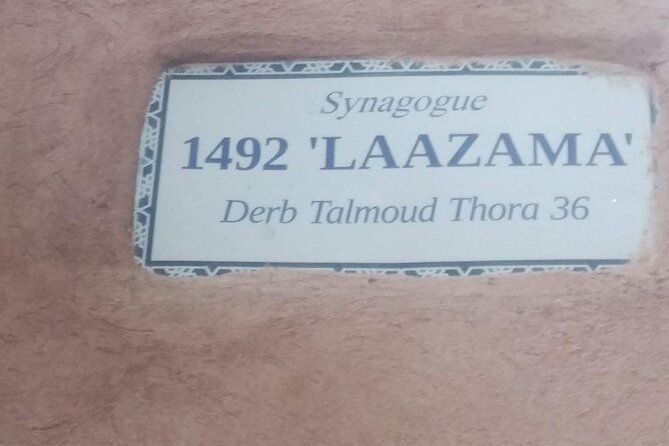
Exploring the cultural heritage and traditions of Marrakech reveals a rich tapestry woven from centuries of Jewish influence. Jewish customs and festivals blend harmoniously with the vibrant local culture, enriching the city’s identity. The Jewish community contributed significantly to Moroccan cuisine, music, and art, creating a unique cultural landscape.
| Aspect | Description |
|---|---|
| Cuisine | Dishes like couscous and tagine, often featuring local spices. |
| Festivals | Celebrations such as Hanukkah and Passover, showcasing traditional practices. |
| Music | Traditional melodies, including Andalusian music, reflect Jewish history. |
| Art | Synagogue decorations and intricate craftsmanship highlight Jewish artistry. |
These elements demonstrate how Jewish heritage continues to thrive in Marrakech, making it a vital part of the city’s cultural narrative.
Tour Experience Overview
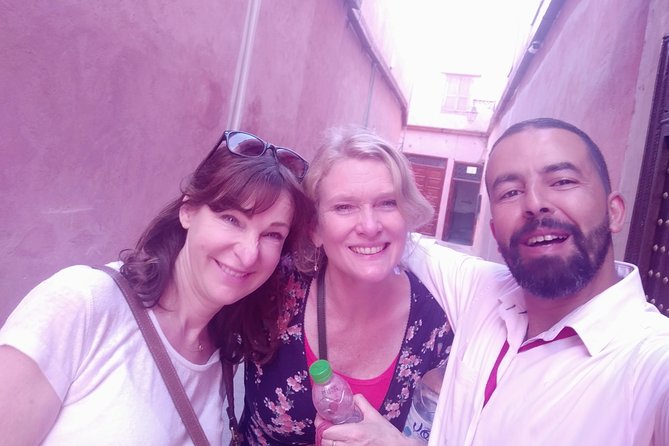
Offering a glimpse into the Jewish heritage of Marrakech, the tour provides an engaging experience for those eager to learn about the community’s rich history and contributions.
Spanning approximately three hours, participants gather at Café Koutoubia at 9:00 am, embarking on a journey through historical sites and significant landmarks.
The tour is designed to be accessible, featuring amenities like bottled water, wheelchair access, and infant seats.
While most travelers can participate, the experience often concludes in about an hour, leaving some feeling rushed.
Despite varying participant feedback, the opportunity to explore Marrakech’s Jewish past remains a compelling attraction for history enthusiasts and curious travelers alike.
- 3 Day Trek in the Atlas Mountains and Berber Villages From Marrakech
- Atlas Mountains & Berber Villages& Cultuer Waterfalls Day Trip
- Atlas Mountains & 3 Valleys Private Tour From Marrakech
- 2-Day Zagora Tour From Marrakech Including the Atlas Mountains, Camel Trek and Desert Camp
- The 10 Tastings of Marrakech With Locals: Private Food Tour
- Marrakesh: Agafay Desert Sunset, Camel Ride, Dinner and Show
Customer Feedback and Insights
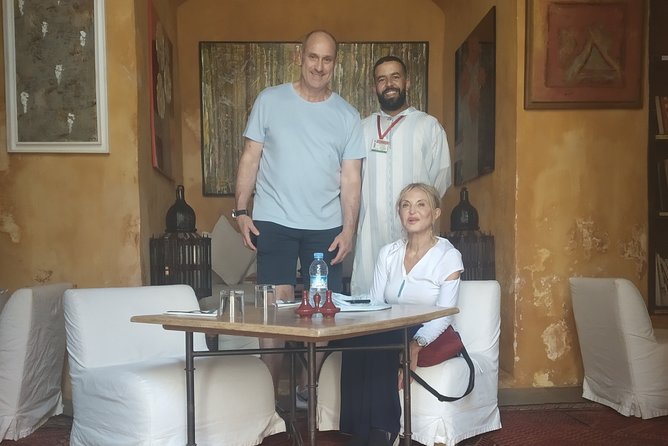
Feedback from participants reveals a mix of experiences regarding the Jewish Heritage tour. While some travelers expressed disappointment over issues like a late guide and a rushed itinerary, others found value in the experience.
Complaints about the guide’s knowledge and professionalism surfaced, with several participants feeling the historical context was lacking. However, one reviewer highlighted Az-Eddine for his friendly demeanor and expertise, calling the tour enriching.
On the other hand, the host acknowledged the negative feedback and stated actions were being taken to improve guide performance. They also defended the service quality, denying refund requests based on customer claims.
This diverse feedback underscores the importance of consistent quality in delivering meaningful heritage experiences.
Future of Jewish Heritage in Marrakech
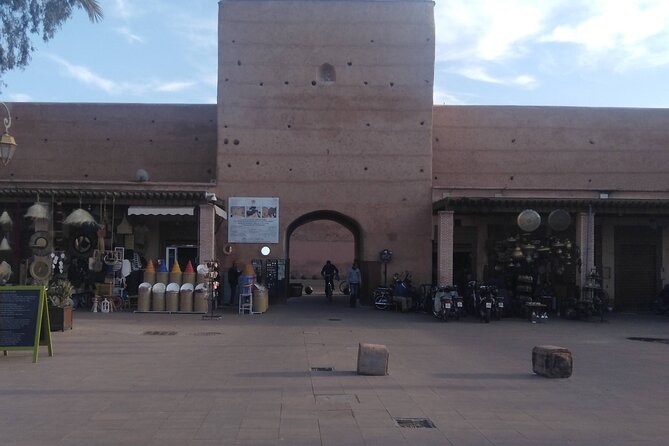
The future of Jewish heritage in Marrakech appears promising, with ongoing efforts to preserve and promote the rich history of the Jewish community in the city. Local organizations are actively working to restore synagogues, cemeteries, and cultural sites, ensuring that the legacy endures for future generations.
Increased interest in Jewish history among travelers has led to the development of educational programs and guided tours, enhancing awareness and appreciation. The community’s engagement with broader cultural initiatives fosters a spirit of inclusivity, encouraging dialogue between different faiths.
As Marrakech embraces its multicultural identity, the Jewish heritage will remain a vital part of the city’s narrative, enriching the cultural tapestry that attracts visitors from around the globe.
Frequently Asked Questions
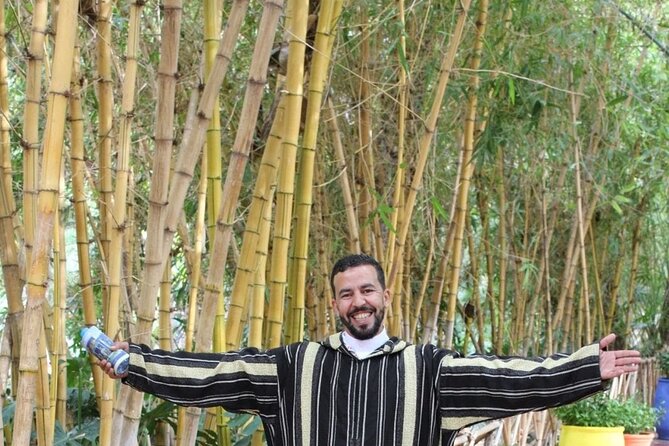
What Is the Maximum Group Size for the Tour?
The maximum group size for the tour is 18 travelers. This limit ensures a more intimate experience, allowing participants to engage deeply with the content while enjoying personalized attention from the guide throughout the journey.
How Long Does the Tour Actually Take?
The tour typically lasts three hours, but many participants report completing it in about one hour. This discrepancy may stem from various factors, including the guide’s pace and the depth of information shared.
Is the Tour Suitable for Infants and Strollers?
The tour’s designed for families, as it’s wheelchair and stroller accessible. With available infant seats and proximity to public transportation, parents can comfortably enjoy the experience without worrying about their little ones’ needs.
Where Is the Meeting Point Located?
The meeting point’s located at Café Koutoubia in Marrakech. Travelers gather there at 09:00 am for the tour. It’s easily accessible and offers a convenient starting point for participants to begin their experience.
Are Refunds Available if I’m Dissatisfied?
Refunds aren’t typically available if dissatisfaction arises. The host acknowledges feedback but denies refund requests, emphasizing service quality. Travelers should communicate concerns directly, as resolution options may vary based on individual circumstances and experiences.
The Sum Up
Marrakech’s Jewish heritage remains a vibrant part of the city’s identity, showcasing a rich history of resilience and cultural contributions. Visitors can explore significant sites like the Mellah and the Aben Danan Synagogue, seeing traditions that have shaped the community. As preservation efforts continue and interest grows, the future of Jewish heritage in Marrakech looks promising, ensuring that this unique cultural tapestry will be celebrated and appreciated for generations to come.
More Historical Tours in Marrakech
- 9 Days Southern Oasis, Kasbahs & Desert Morocco Cultural Tour From Marrakech
- Historical and Cultural Tour of Marrakech
- 10-Day Private Cultural Tour of the Imperial Cities of Morocco
- Enchanting Half-Day Journey of Marrakech Into History & Culture.
- Echoes of History: Journey Through Marrakeshs Treasures
- Visit of the Souks and Historical Monuments of Marrakech
More Tour Reviews in Marrakech
- two days valley trek in the Atlas mountains
- Marrakech: Ourika Valley, Atlas Mountains, Waterfall Hike & Lunch
- 3 Days Desert Tour From Marrakech To Merzouga Dunes & Camel Trek
- 7-Day Morocco Tour from Tangier
- From Marrakech: Quad sunset dinner Experience & show
- Half Day Private Sightseeing Tour in Marrakech City
Not for you? Here's more nearby things to do in Marrakech we have reviewed
- two days valley trek in the Atlas mountains
- Marrakech: Ourika Valley, Atlas Mountains, Waterfall Hike & Lunch
- 3 Days Desert Tour From Marrakech To Merzouga Dunes & Camel Trek
- 7-Day Morocco Tour from Tangier
- From Marrakech: Quad sunset dinner Experience & show
- Half Day Private Sightseeing Tour in Marrakech City
- Marrakesh: Early Morning 40-Minute Balloon Flight
- Royal Ritual: Hammam, Massage, Facial & Foot Care of Royalty
- Buggy Tour in Agafay Desert
- 9 Days Private Round Trip From Tangier via Fez, Merzouga Desert & Marrakech
- 5-Day Private Desert Tour From Marrakech
- 5 Day Locally Immersive Mountain Trek | Through Villages in Atlas Mountain
